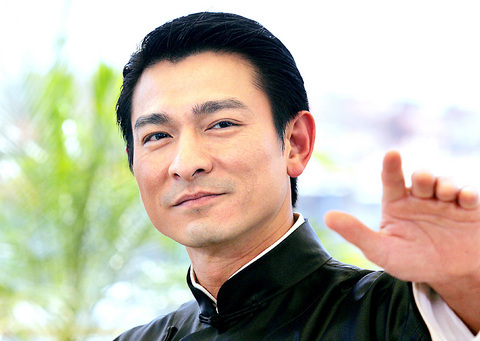This week's only Asian movie whch is being released is Where is Mama's Boy (花街歡樂坊), starring William Hung (孔慶祥), in a role tailor-made for him. The Hong Kong-made costume comedy takes advantage of Hung's comedic talent in the hopes that it will generate box office success.
Hung was a UC Berkeley student who made his name after an audition on US TV show American Idol. His not-so-sexy performance of Ricky Martin's She Bang received harsh comments from the judges but unexpected laughter from TV viewers, and Hung has been widely popular ever since.
Where is Mama's Boy also has many faces familiar to Hong Kong comedies including Wong Yu-fat (黃一飛) from Shaolin Soccer; Lam Tze-chung (林子聰), the chubby partner of Stephen Chow (周星馳) in Kung Fu Hustle; as well as Nancy Sit (薛家燕).

PHOTO: AFP
Hung, famous for his singing and clumsy dance steps, no doubt will perform a few songs in this pseudo-musical, pseudo-martial-arts comedy.
The story of Where is Mama's Boy revolves around a red-light district in south China during the Ming dynasty. Foon Inn is the most famous bar and brothel in the area and draws enough customers -- even from noble families -- to pack the place every night.
Hung plays a happy vender selling clay-oven buns. He does not like to visit the Foon Inn, but he helps the madam and her ladies when it is suddenly closed down by gangsters. After all the vanity is washed away, the women realize the truth of happiness and began to appreciate the beauty of simple lives.

PHOTO COURTESY OF SHENGCHI INTL MEDIA
In other film news, Hong Kong star Andy Lau (劉德華) and his Focus Films (映藝娛樂) last Wednesday announced plans to produce a pack of six Chinese-language projects by up-and-coming filmmakers from across Asia in Hong Kong, Taiwan, China, Malaysia and Singapore.
It is the first time that such a project has been initiated in the region. Each feature film will be produced in high-definition technology and will be shot in its home market using a local cast and production network.
Calling the project Focus First Cuts, Andy Lau said the project is to cultivate a new generation of filmmakers in Asia.
"Besides producing big commercial film projects, we also want to cultivate new filmmakers by arranging the necessary resources and support to realize their potential and reach out to a wider audience," Lau said last Wednesday at Hong Kong Filmart, an Asian film and TV trade show.
Lau said the budget of all six features is planned to be HK$25 million (NT$101 million), with each film estimated to cost about HK$6 million (NT$24 million), which is considered low for Hong Kong filmmaking.
Robin Lee (李芸蟬) represents Taiwan with a film tentatively called Ren Yu Duo Duo (人魚朵朵), a fairy tale about a girl's relationship with shoes. Lee attracted Lau's attention at the 2004 Golden Horse Awards (金馬獎), when Lau saw Magic Washing Machine (神奇洗衣機) and was intrigued by the urban fantasy story, Lee's first short feature, which won Best Short Film.
Also benefiting from the project are Hong Kong's Lam Tze-chung, the Kung Fu Hustle comedian; Wong Ching-po (黃精甫) and Lee Kung-lok (李公樂), who directed the Andy Lau vehicle Jiang Hu (江湖) and the acclaimed indie drama Fubo (福伯); Malaysia's Ho Yuhang (何宇恆); and Singapore's Kevin Tong (唐永健). The Chinese project is yet to be announced.
Star Chinese Movies Network (衛視電影台), a satellite broadcaster under the STAR group, has the rights to exclusive television premieres and broadcasts of the six Chinese-language projects in Asia, except in Japan, South Korea and Thailand.

From the last quarter of 2001, research shows that real housing prices nearly tripled (before a 2012 law to enforce housing price registration, researchers tracked a few large real estate firms to estimate housing price behavior). Incomes have not kept pace, though this has not yet led to defaults. Instead, an increasing chunk of household income goes to mortgage payments. This suggests that even if incomes grow, the mortgage squeeze will still make voters feel like their paychecks won’t stretch to cover expenses. The housing price rises in the last two decades are now driving higher rents. The rental market

July 21 to July 27 If the “Taiwan Independence Association” (TIA) incident had happened four years earlier, it probably wouldn’t have caused much of an uproar. But the arrest of four young suspected independence activists in the early hours of May 9, 1991, sparked outrage, with many denouncing it as a return to the White Terror — a time when anyone could be detained for suspected seditious activity. Not only had martial law been lifted in 1987, just days earlier on May 1, the government had abolished the Temporary Provisions Effective During the Period of National Mobilization for Suppression of the Communist

Hualien lawmaker Fu Kun-chi (傅?萁) is the prime target of the recall campaigns. They want to bring him and everything he represents crashing down. This is an existential test for Fu and a critical symbolic test for the campaigners. It is also a crucial test for both the Chinese Nationalist Party (KMT) and a personal one for party Chairman Eric Chu (朱立倫). Why is Fu such a lightning rod? LOCAL LORD At the dawn of the 2020s, Fu, running as an independent candidate, beat incumbent Democratic Progressive Party (DPP) lawmaker Hsiao Bi-khim (蕭美琴) and a KMT candidate to return to the legislature representing

Fifty-five years ago, a .25-caliber Beretta fired in the revolving door of New York’s Plaza Hotel set Taiwan on an unexpected path to democracy. As Chinese military incursions intensify today, a new documentary, When the Spring Rain Falls (春雨424), revisits that 1970 assassination attempt on then-vice premier Chiang Ching-kuo (蔣經國). Director Sylvia Feng (馮賢賢) raises the question Taiwan faces under existential threat: “How do we safeguard our fragile democracy and precious freedom?” ASSASSINATION After its retreat to Taiwan in 1949, the Chinese Nationalist Party (KMT) regime under Chiang Kai-shek (蔣介石) imposed a ruthless military rule, crushing democratic aspirations and kidnapping dissidents from